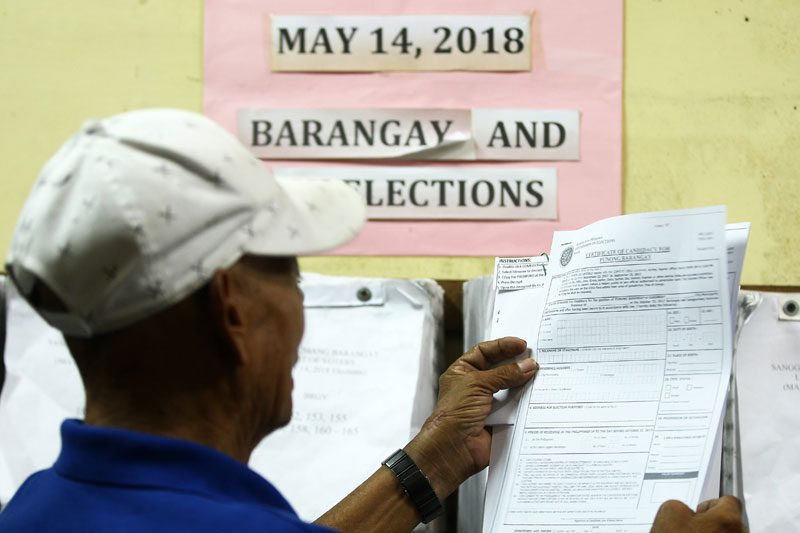Election season on

PNP: 5,744 barangays to be monitored
MANILA, Philippines — After two postponements, candidates for barangay and Sangguniang Kabataan or SK posts can finally file their certificates of candidacy (COCs) starting today even as authorities monitor 5,744 barangays as possible hot spots.
Commission on Elections (Comelec) spokesman James Jimenez said the country will be under the election period from today until May 21, during which a nationwide gun ban will be in effect.
Candidates can file COCs from April 14 to 20. Up for grabs in the elections are one seat for captain and seven for the council or sanggunian in each of the 42,041 barangays.
For the SK polls, the available positions are one chairperson and seven members for every barangay. Qualified to run are those aged 18 to 24.
The COCs may be filed from 8 a.m. to 5 p.m. at the Office of the Election Officer in the city or municipality where the candidate is running.
Jimenez added that during the election period, the License to Own and Posses Firearms (LTOPF) is suspended to minimize election-related violence.
“At 12:01 ... of April 14, the ban will take effect and the setting up of checkpoints will commence,” he maintained.
Comelec Resolution No. 10197, promulgated Sept. 14, 2017, stated that “during the election period, no person shall bear, carry or transport firearms or other deadly weapons in public places, including any building, street, park, private vehicle or public conveyance, even if licensed to carry the same, unless authorized in writing by the Commission.”
Only regular members of the Philippine National Police (PNP), the Armed Forces of the Philippines and other law enforcement agencies of the government are authorized to carry and possess firearms, provided that they are on duty.
During election period, Comelec checkpoints shall also be established in each city/municipality. More checkpoints can only be set up in coordination with election officers of the poll body.
Aside from the gun ban, it is also prohibited to transfer officers and employees in the civil service, including public school teachers; and suspension of elective provincial, city, municipal, or barangay officials, among others.
The Comelec also urged voters to be vigilant and watch out for unqualified candidates and SK bets belonging to political dynasties. Jimenez said voters should help the commission implement for the first time the anti-dynasty law on SK candidates.
“We will need voter vigilance. If anybody knows that a candidate has relatives or family members elected, there is no stopping them from questioning the eligibility of that candidate,” Jimenez said.
“I think it would be better if anyone knew of any ineligibility to bring it to life,” Jimenez added.
Under the SK Reform Act of 2015 a Sangguniang Kabataan official “must not be related within the second civil degree of consanguinity or affinity to any incumbent elected national official or to any incumbent elected regional, provincial, city, municipal, or barangay official, in the locality where he or she seeks to be elected.”
Since the law’s passage more than two years ago, it will be implemented for the first time in the coming May elections.
Those who would file COCs for an SK post will have to declare under oath that they are not related within the second civil degree of consanguinity or affinity to any incumbent elected national official or to any incumbent elected regional, provincial, city, municipal, or barangay official, in the locality where he or she seeks to be elected.
Jimenez said candidates related to elected officials face disqualification as well as perjury and election offense for submitting a false or spurious COC.
According to Jimenez, a petition must be filed at the soonest possible time to remove candidates not qualified to run in the coming polls including SK bets that belong to political clans.
He noted that the Comelec is obliged to accept the COCs filed by all potential candidates.
Those aspiring to run in the May 14 polls have until April 20 to file their COCs.
But, Jimenez said, it would be best for people to contest the COCs immediately upon filing.
Jimenez admitted that the Comelec could not check all SK candidates if they are part of political dynasties.

A man with a certificate of candidacy at a local Comelec office in Manila ahead of the start of the filing of COCs today. Miguel de Guzman
“Considering that there are 42,000 barangays, can you imagine the kind of checking you need to do? You’re looking at one SK chairman and seven SK kagawads per barangay. How many hours will you need to check? It’s not practical,” Jimenez explained.
Poll-related violence
The PNP is monitoring at least 5,744 barangays for possible poll-related violence as part of security measures for the barangay and SK elections.
PNP spokesman Chief Superintendent John Bulalacao said violence could occur in the barangays included in the election watchlist of areas (EWAs) because of five factors: intense rivalry among the candidates, history of election-related violence arising from political rivalries, presence of private armed groups, areas with armed threats and proliferation of loose firearms.
Based on data from the PNP Directorate for Intelligence (DI), Bulalacao said Bicol region registered the highest number of barangays
in the list with 1,258 followed by the Autonomous Region in Muslim Mindanao (ARMM) with 832 and Central Luzon with 504.
Incoming PNP chief Director Oscar Albayalde, currently the head of the National Capital Region Police Office, earlier said at least 53 barangays in Metro Manila are being monitored for possible election-related violence.
The PNP is also monitoring 78 active private armed groups with around 2,000 members with 1,600 assorted firearms.
Police said 92 percent or 72 groups composed of 1,990 members with 1,500 firearms are in the ARMM.
Bulalacao said two such groups are in Bicol while Central Luzon, Cordillera, Ilocos and Calabarzon (Cavite, Laguna, Batangas, Rizal and Quezon) regions have one armed group each.
The military said soldiers are ready to serve as members of the board of election inspectors (BEI) if they are deputized by the Comelec after the Department of Education (DepEd) stated it will not oblige public school teachers to serve in the coming barangay and SK polls.
Col. Leonel Nicolas, commander of the Joint Task Force Zamboanga (JTFZ), said during their recent meeting with the Comelec regional official in Zamboanga City that the poll body has not yet requested for soldiers to serve as BEI members.
Comelec regional director Wilfred Balisado, however, said that some policemen could be designated as BEI members but no soldiers will serve as poll officers.
He said the Comelec will train policemen that would be deputized as BEI members in barangays considered as critical or areas where teachers are not willing to serve in the elections.
Education Secretary Leonor Briones early this week categorically announced here that they will not oblige the teachers to serve in the election.
She said those who will be serving will be voluntary on the part of the teachers.
Meanwhile, the military and police in this southern port city have intensified the security in the island villages in line with the barangay and Sanggunian Kabataan election.
The Comelec and the Department of the Interior and Local Government (DILG) are monitoring three-termer barangay officials that have already served their third and final term but plan to run for re-election despite the prohibition.
DILG officer-in-charge Eduardo Año yesterday reminded barangay officials of a provision in the Local Government Code prohibiting local elective officials from holding to the same post for three consecutive terms.
Año advised barangay officials on their third consecutive term to give way to other candidates instead of holding to their current posts.
Citing their records, Año said there are 8,927 barangay captains and 51,273 councilors on their third consecutive term.
DILG spokesman Assistant Secretary Jonathan Malaya said preventing officials on their third term is part of the government’s efforts against possible irregularities in the barangay and SK elections.
Environmentalists reminded yesterday barangay and Sangguniang Kabataan candidates to help promote awareness to protect the environment.
The EcoWaste Coalition pointed out the need for candidates to demonstrate their commitment to the environment.
“The May 14 polls offer a unique opportunity for would-be barangay and youth leaders to articulate and show their commitment to the preservation and protection of the environment,” said Daniel Alejandre, campaigner of EcoWaste Coalition.
The coalition urged candidates to use recyclable and environment-friendly campaign materials and to avoid those materials that contain hazardous additives.
The group advised candidates to refrain from using Styrofoam, plastic bags and other single-use containers for volunteers’ meals and drinks.
Foreign nationals and organizations that wish to observe the barangay and SK polls should get Comelec accreditation.
Based on Comelec Resolution No. 10293 promulgated last April 11, the poll body said that foreigners and foreign group, organization, committee or association are advised against “prohibited acts” such as aiding any candidate directly or indirectly.
“International election observation plays an important role in providing accurate and impartial assessment about the nature of the electoral process and has the potential to enhance the integrity of election process,” Comelec said.
However, Comelec noted there is a need to regulate the activities of foreign observers in the elections.
The poll body added that foreign observers are banned to take part or influence in any manner the conduct of the elections and engage in partisan political activities.
Foreign observers are also prohibited from contributing or making any expenditure in connection with any election campaign or partisan political activities. With Mayen Jaymalin, Emmanuel Tupas, Rhodina Villanueva, Roel Pareño
- Latest
- Trending





























